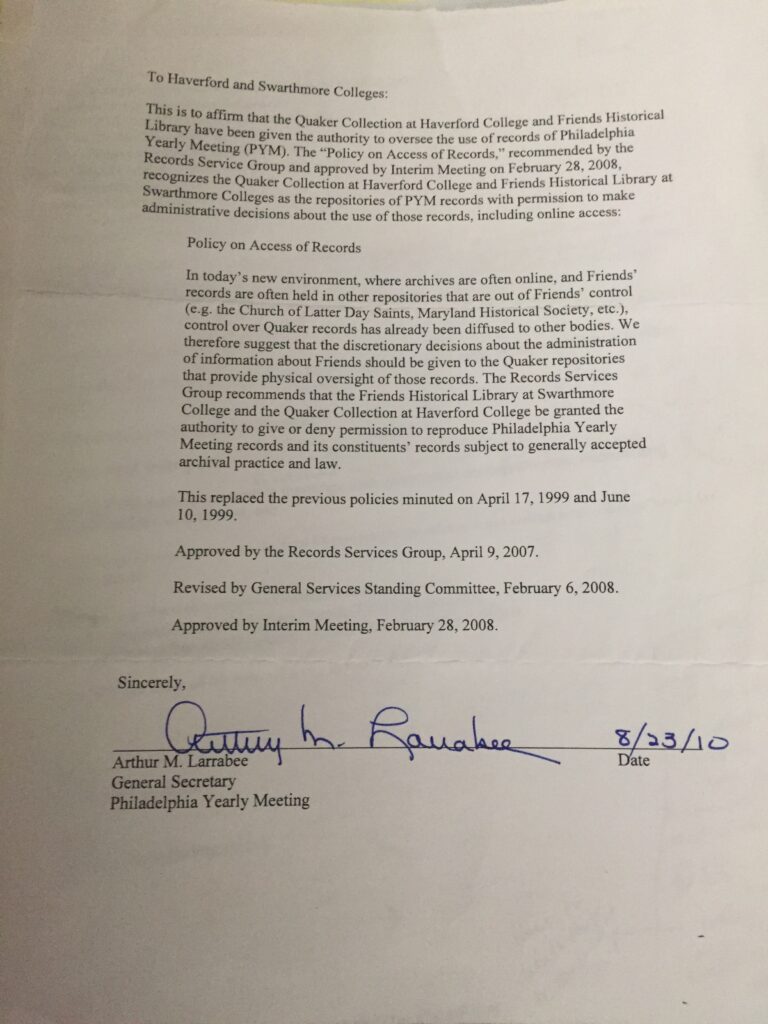Accessing Philadelphia Yearly Meeting records
Philadelphia Yearly Meeting’s historical records are housed at two Philadelphia-area libraries: the Haverford College Quaker & Special Collections (QSC) and the Friends Historical Library of Swarthmore College (FHL). Meetings retain ownership while FHL and QSC serve as stewards, ensuring long-term preservation and free public access.
A Brief History:
The records relationship between PYM and the libraries dates to 1926, when the Hicksite PYM designated FHL as the home for its records. In 1965 the united PYM officially arranged for its records to be deposited at either FHL or QSC (an arrangement that means some meetings have records at both libraries). In 2008, PYM’s Records Services Group shepherded the most recent update through Interim Meeting: a policy that grants FHL and QSC “authority to give or deny permission to reproduce Philadelphia Yearly Meeting records and its constituents' records subject to generally accepted archival practice and law.” As the collections grow and formats change, FHL and QSC will continue to collaborate with PYM to ensure the twin needs of access and preservation.
Using PYM records:
Like all archives, the majority of PYM’s records are not online. Instead, we invite everyone to come to the Haverford and/or Swarthmore campuses to use the collections. Archives can be disorienting, so we have some general resources available, including a guide for Quaker meeting records. Users find collections by searching a database of “finding aids,” which describe records at a summary level. Staff are also available to help answer questions, both onsite and remotely.
A subset of PYM records are available online. These include paper records that have been “digitized” as well as “born digital” records that have always existed digitally. The same finding aids that describe paper records will also point you to records that exist online - or you can search the shared Digital Collections website directly.
Some PYM records are also available from other websites not affiliated with FHL or QSC. The Philadelphia Congregations Early Records project (made possible by over $400,000 in grant funding) incorporates digitized material from 8 Philadelphia meetings. Ancestry.com, a paid database, has a “Quaker Records Portal” that includes PYM’s pre-1935 minutes and vital records (part of more than 7 million Quaker meeting records that were indexed and digitized by Ancestry in the early 2010s).
As the costs of digital record creation and management are substantial, the majority of PYM records will remain accessible in FHL and QSC’s reading rooms. In recognition of these barriers, both libraries have policies related to remote research and scanning requests to better serve users unable to visit the physical libraries.
Access to archives:
We aim to be open, equitable, and transparent in providing access to historical documents. With the exception of those records “restricted” for a period of time (generally things like Care & Counsel records), PYM’s records are available to everyone. Users of PYM records include Quaker and non-Quaker researchers and genealogists, from Philadelphia and from around the world. And Quaker meeting records are only one kind of material available at QSC and FHL. To learn more about our holdings, please see the December 2022 issue of Quaker Studies (open access) with a Research Note on Haverford and Swarthmore holdings.
We look forward to continuing to be in relationship with meetings of Philadelphia Yearly Meeting, and invite further conversation!
Mary Crauderueff, Curator of Quaker Collections, Haverford College Quaker & Special Collections
Caitlin Goodman, Archivist, Friends Historical Library of Swarthmore College
All of our historic minutes and records are archived and cataloged online for easy viewing and searching but behind a paywall of Ancestory .com. Ancestory .com is now owned by Blackstone Inc. and has been since 2020. Blackstone has been called the world's largest residential landlord and has been accused by the United Nations of unfair housing practices. Blackstone's founder, Stephen Schwarzman, supported lawmakers who voted to overturn the 2020 election results to the tune of 33.5 million dollars. He is also under scrutiny for financial support of a campaign group – Georgians for Kelly Loeffler – who's alleged tactics included Facebook ads that darkened the skin of his opponent. I have been told that the decision to turn over our records to Ancestory for scanning and achieving was made at a PYM interim meeting that decided on behalf of the monthly and quarterly meetings in 2008. (see the letter from PYM below) I have also been told that while Ancestory did send back raw data files, they are unable to be accessed by anyone but the Haverford Librarians on site. Reportedly, Ancestory did make those records available for free online, but they are only accessible onsite. at Haverford, Swarthmore, Earlham, and Guilford colleges; making anyone who has accessibility needs or other needs that require use from home forced to buy a membership. Who speaks for the records of individual Meetings and is it time to revisit the decision made in 2008?


